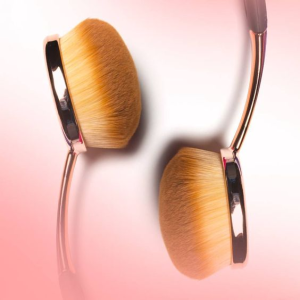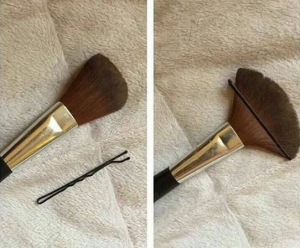How to Wash Makeup Brushes: Ultimate Guide and Tips
How to Wash Makeup Brushes
To effectively wash your makeup brushes, start by gathering the necessary supplies like mild soap or specialized brush cleaner, lukewarm water, and a clean towel. Wet the brush bristles without wetting the base, then apply a small amount of mild soap or cleaner and gently lather it. Use a brush cleaning pad or your palm to work the soap through the bristles, removing makeup residue. Rinse the brushes thoroughly, gently squeeze out excess water, reshape the bristles, and allow them to air dry completely before using. Regular cleaning, at least once a week, is essential to maintain brush hygiene and ensure a flawless makeup application.
Frequency and Timing of Makeup Brush Cleaning
Cleaning your makeup brushes is a crucial routine that should ideally be performed at least once a week. However, the frequency can vary based on how often you use your brushes. Brushes used daily should be cleaned more frequently, while those used less frequently can be cleaned on a weekly basis. It’s essential to find a balance that ensures your brushes remain free of residue, bacteria, and product buildup, promoting both effective makeup application and good skin health. Also, read about The Splash Fashion
Steps to Clean Makeup Brushes Effectively
Gather Necessary Supplies
Before embarking on the cleaning process, gather essential supplies such as mild soap, olive oil, lukewarm water, a clean towel, and a brush cleaning pad.
Pre-cleaning Preparation
Start by wetting the brush bristles under running water. Be careful not to wet the base of the brush, as it can weaken the glue and cause bristle shedding.
Detailed Cleaning Process
Apply a gentle soap or specialized brush cleaner to the brush and lather gently. Use the brush cleaning pad or your hand to work the soap through the bristles, removing makeup residues and impurities.
Drying and Maintenance
Allow the brushes to air dry by placing them on a towel. Ensure they are completely dry before storing them. Additionally, reshape the bristles while they’re still damp to maintain their original form.
Special Considerations for Different Brush Types
When cleaning makeup brushes, it’s important to tailor your approach based on the type of brush you’re cleaning. Different brushes have varying bristle materials – natural or synthetic – which influence the cleaning process. For natural bristle brushes, opt for gentle cleansers to preserve their integrity, while synthetic brushes can handle slightly stronger cleansers. Additionally, consider the function of the brush – brushes used for powders, liquids, or creams may require different cleaning techniques. Adapting your cleaning routine to accommodate these differences ensures you clean each brush effectively, extending its lifespan and maintaining optimal performance. Discover more about Max Fashion UAE
Importance of Proper Drying
Proper drying of makeup brushes is a critical step in the brush cleaning process. It might seem like a minor detail, but it plays a significant role in maintaining the quality and hygiene of your brushes. Here’s why ensuring your brushes are thoroughly dried is so important:
Preventing Mold and Bacteria Growth
Brushes that are not dried properly can become a breeding ground for mold, mildew, and bacteria. These microorganisms thrive in damp environments and can cause skin irritations and infections when they come into contact with your skin.
Preserving Brush Shape and Functionality
Drying your brushes correctly helps maintain the original shape and structure of the bristles. If brushes are left to air dry improperly, water can accumulate in the ferrule (the metal part that holds the bristles), causing the bristles to separate or fall out.
Extending Brush Lifespan
By ensuring your brushes are dry before storing them, you’re prolonging their lifespan. Excess moisture can weaken the glue that holds the bristles, leading to shedding and, eventually, rendering the brush unusable.
Maintaining Brush Performance
Brushes that are thoroughly dried perform better during makeup application. Damp bristles can dilute the makeup and affect the product’s consistency, making it challenging to achieve the desired makeup look.

Benefits of Regular Brush Cleaning
Regularly cleaning your makeup brushes is a fundamental aspect of maintaining good hygiene and ensuring a flawless makeup application. The advantages of maintaining a routine of cleaning your brushes go beyond just cleanliness; they significantly impact both your makeup routine and your skin health. Here are some notable benefits:
Enhanced Makeup Application
Clean brushes ensure a smoother and more precise makeup application. Makeup products are applied evenly on a clean brush, allowing for a flawless finish.
Prolonged Brush Lifespan
Regular cleaning helps to extend the life of your brushes. Dirt, oils, and makeup residue can accumulate and deteriorate the bristles over time, leading to a shorter lifespan. Proper cleaning prevents this buildup and keeps your brushes in excellent condition for longer.
Prevention of Skin Issues
Dirty brushes can harbor bacteria, oils, and old makeup, which may lead to skin irritations, acne breakouts, or even infections. Regularly cleaning your brushes minimizes the risk of transferring harmful substances to your skin.
Maintained Brush Shape and Performance
Cleaning your brushes ensures that they maintain their shape and functionality. Makeup residue can cause the bristles to clump or lose their form, affecting how they apply makeup.
DIY vs. Commercial Brush Cleaning Solutions
Cleaning your makeup brushes is a vital step in maintaining their performance and ensuring a hygienic makeup application. When it comes to choosing the right cleaning solution, you have two main options: Do-It-Yourself (DIY) solutions or Commercial Brush Cleaning Solutions. Each has its advantages and considerations. Let’s explore both to help you decide which approach suits your needs best.
DIY Brush Cleaning Solutions
Advantages:
Cost-Effective: DIY solutions are often made from common household items like dish soap, olive oil, or baby shampoo, making them cost-effective compared to buying specialized commercial brush cleaners.
Customizable: You can tailor the DIY solution based on your preferences and the type of makeup you use. For instance, you can choose gentle ingredients if you have sensitive skin or opt for stronger cleansers for stubborn makeup residue.
Readily Available Ingredients: DIY solutions use easily available ingredients, making them accessible and convenient for quick brush cleaning.
Commercial Brush Cleaning Solutions
Advantages:
Formulated for Brushes: Commercial brush cleaning solutions are specifically designed to clean makeup brushes effectively, ensuring thorough cleaning and disinfection.
Convenience: They offer a quick and hassle-free solution. Just apply the cleaner and follow the instructions provided, saving you time and effort.
Specialized Formulations: Commercial brush cleaners often contain ingredients that help condition and extend the life of your brushes, promoting longevity and optimal performance.
Additional Tips and Tricks
When it comes to cleaning your makeup brushes, there are some additional tips and tricks that can streamline the process and ensure your brushes are thoroughly cleaned and well-maintained. Here are some expert recommendations:
Regular Cleaning Routine
Make it a habit to clean your brushes regularly, preferably once a week. Consistent cleaning prevents makeup buildup and maintains brush hygiene.
Spot Cleaning
For a quick clean between uses, consider using a brush cleaner spray or a gentle makeup wipe to remove excess product from the brush.
Avoid Soaking the Base
When cleaning your brushes, avoid submerging them fully in water as this can weaken the glue that holds the bristles and lead to shedding.
Be Gentle
Always handle your brushes gently during cleaning. Vigorous scrubbing can damage the bristles and affect the brush’s performance.

Cleaning Brushes for Sensitive Skin
Sensitive skin can easily react to harsh chemicals or strong cleansers found in some brush cleaning products. To protect your skin from irritation, it’s crucial to choose cleansers that are specifically designed for sensitive skin. Look for hypoallergenic, fragrance-free, and mild cleansers. These products will effectively clean your brushes without causing any adverse reactions to your skin. Always check the product labels and choose gentle options to maintain the health and comfort of your sensitive skin.
The Link Between Clean Brushes and Skin Acne
One of the key contributors to skin acne and breakouts is the accumulation of bacteria, oil, and old makeup residue on your makeup brushes. When you use dirty brushes, you transfer these impurities back onto your skin, clogging pores and potentially causing acne. Regularly cleaning your brushes helps eliminate these skin-irritating elements, reducing the likelihood of acne and promoting clearer, healthier skin. It’s a simple yet effective step in maintaining good skin hygiene and preventing unwanted skin issues.
Addressing Hygiene Concerns
Clean makeup brushes are not only vital for the application of makeup but also essential for overall skin hygiene. Dirty brushes can harbor bacteria, fungi, and other microorganisms that thrive in leftover makeup and moist bristles. When you use these contaminated brushes, you expose your skin to potential infections and skin issues. By prioritizing regular brush cleaning, you ensure that your makeup routine remains hygienic and contributes to the overall health and wellness of your skin.
Expert Opinions on Makeup Brush Hygiene
Experts in the beauty and skincare industry consistently emphasize the importance of maintaining clean makeup brushes. Not only does it ensure a smoother makeup application, but it also directly impacts the health of your skin. Clean brushes prevent the transfer of bacteria and contaminants to your skin, reducing the risk of skin irritations, allergies, and infections. Beauty professionals and dermatologists unanimously recommend a regular brush cleaning routine to maintain optimal makeup results and promote a healthy complexion. Following their advice can lead to a more enjoyable and safer makeup experience.
Conclusion
Regularly cleaning your makeup brushes is a fundamental step in maintaining a healthy skincare routine and ensuring a flawless makeup application. By following the outlined steps and making this a consistent practice, you’ll not only extend the lifespan of your brushes but also promote a healthier complexion.
FAQs
Q1: How often should I clean my makeup brushes?
A: Brushes used daily should be cleaned at least once a week to maintain hygiene and functionality.
Q2: Can I use regular soap to clean my brushes?
A: It’s best to use a gentle, specialized brush cleaner to ensure the longevity of your brushes.
Q3: How do I dry my brushes properly after cleaning?
A: Lay them flat on a clean towel to air dry, ensuring they’re completely dry before use.
Q4: Are there any alternatives to brush cleaning pads?
A: You can use your hand or a silicone kitchen mat as an alternative to a brush cleaning pad.
Q5: Can I share my makeup brushes with others?
A: It’s advisable to avoid sharing makeup brushes to prevent the spread of bacteria and infections.
